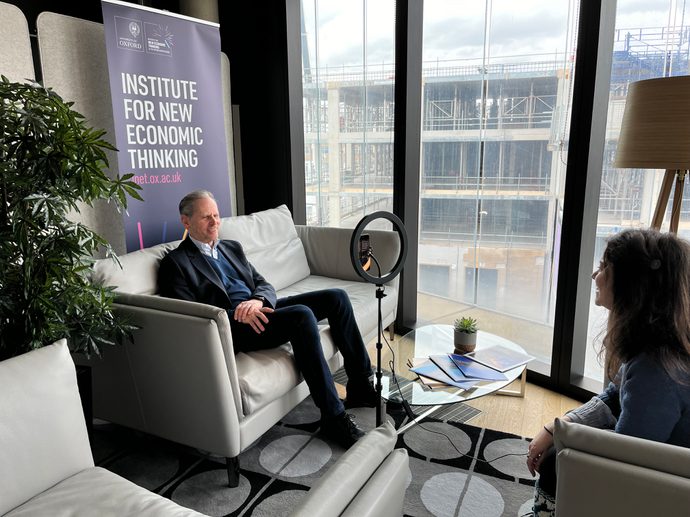A team of researchers led by Matteo Gasparini has won the FIR-PRI best published article award for their research that identified implicit bias in financial accounting rules - a key driver of profitability for banks – which inflates the cost of divesting from high carbon industries towards renewables.
The award, which will be presented in Paris at a ceremony on 1st October 2024, was announced today by the Forum pour l’Investissement Responsable – FIR and relates to work published by Matteo Gasparini, Matthew Ives, Ben Carr, Sophie Fry & Eric Beinhocker in Nature Climate Change earlier in the year.
Under European financial regulations, banks must account for risk in firms and investments. Capital requirements, for example, force banks to hold higher capital buffers for investments that are estimated to be riskier.
However, during a detailed analysis of data from the European Banking Authority transparency exercise, the research team found that the statistical models that are widely used by banks to comply with these regulations produce a lower risk rating for high carbon (1.8%) than low carbon sectors (3.4%). The difference was likely caused by the backward-looking nature of financial models.
The researchers found that this gap produces a significant implication for banks’ return on capital and profitability, heavily influencing management decisions, and creating disincentives for financial institutions to divest their portfolios from high carbon assets. The authors have called for European financial regulations to be urgently updated to reflect future risk more accurately.
Matteo Gasparini, Matthew Ives, Ben Carr, Sophie Fry and Eric Beinhocker said: “It is a great privilege to receive this award. In our research, we show that, as they currently stand, some financial regulations may unintendedly dis-incentivise the shift of funds away from carbon emitting activities impairing the transition to net zero carbon emissions. We hope our work could contribute to the important debate around the role of financial regulations in the net zero carbon transition.”
This year, the FIR-PRI Award Jury, made up of academic researchers and responsible investment professionals, was chaired by Nicolas Mottis, Professor at École Polytechnique.
Nicolas Mottis said: “This year again, the submissions to the different categories of the FIR-PRI Awards have beaten records, with an increased geographical diversity of the contributors. Once again, these Awards highlight the richness and dynamism of the sustainable finance research community. This has generated very stimulating discussions between jury members and obviously some real challenges to choose the winners.”
A call for entries was launched in five categories: Best Published article, Best Master thesis, Best PhD thesis, Best Pedagogical initiative and Research Grant for an ongoing PhD thesis. 57 applications were received. The full list of winners can be found in the FIR-PRI press release.
About the FIR-PRI Awards
FIR-PRI Awards were created in 2005 by French SIF. We partnered in 2011 with the Principles for Responsible Investment (PRI) in 2011.
The French Sustainable Investment Forum (FIR) is a multi-stakeholder association founded in 2001 to promote and develop Sustainable Responsible Investment (SRI). The FIR brings together all SRI stakeholders: investors, management companies, financial intermediaries, extra-financial rating agencies, investor advisors, market organisations, trade unions, NGOs, associations as well as qualified personalities: lawyers, journalists, academics... The FIR is a player in the dialogue and engagement with listed companies on sustainable development issues (investor briefs, thematic studies, written questions to CAC 40 general meetings, etc.). The Forum is also the promoter of the Responsible Finance Week which is held every year in the autumn. The FIR is one of the founding members of Eurosif.
The PRI works with its international network of signatories to put the six Principles for Responsible Investment into practice. Its goals are to understand the investment implications of environmental, social and governance (ESG) issues and to support signatories in integrating these issues into investment and ownership decisions.
The PRI acts in the long-term interests of its signatories, of the financial markets and economies in which they operate and ultimately of the environment and society as a whole. The six Principles for Responsible Investment are a voluntary and aspirational set of investment principles that offer a menu of possible actions for incorporating ESG issues into investment practice. The Principles were developed by investors, for investors. In implementing them, signatories contribute to developing a more sustainable global financial system.









